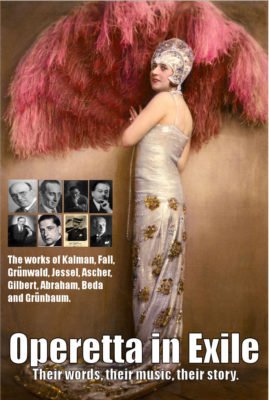Operetta in Exile
Beautiful Work Pays Tribute to Jewish Culture Lost in the Holocaust
On October 21st, Chicago Folks Operetta presented a one-night show, Operetta in Exile. The ninety minute long piece was a tribute to the Jewish composers and lyricists of the Berlin and Vienna operetta genre who remain largely unknown in English. Part revue and part history lesson, the piece is an example of CFO’s dedication to spreading appreciation for central European culture in North America.
CFO’s productions feature classically trained opera singers who work with the Lyric Opera of Chicago and Chicago Symphony Chorus. The group is run by a husband-wife team, Gerald Frantzen and Alison Kelly, who also perform. They are accompanied by a chamber orchestra, and use original translations by the group’s dramaturge, Hersh Glagov. The group is a labor of love by a small number of people dedicated to the art; in place of projected supertitles, the German songs are translated in the program.
Operetta in Exile begins with six songs from Die Blume von Hawaii, a 1931 collaboration between three Jewish artists, Paul Abraham, Alfred Grunwald, and Fritz Lohner-Beda. The story is typical of what defines an operetta: it is light-hearted, uses stock characters, and a formulaic plot. However, between the songs we learn about Abraham’s persecution at the hands of the Nazis. He fled Germany in 1933, struggled as a piano player in Havana and then New York City, went insane, and spent the rest of his life confined to mental hospitals without understanding where he was. Later on CFO’s songs were in English, but these first songs were in German to pay homage to the originals. CFO’s interpretation of these songs emphasizes their minor-key and mournful sound more than served Abraham’s original purpose, but I was impressed by his ability to make a zither sound so tragic.
Other featured composers got about one song each, coupled with a brief biography explaining their fates. There was Leon Jessel, a convert to Catholicism whose nationalistic music Hitler loved and who tried collaborating with the Nazis, but was caught sending a letter critical of them. He was tortured to death. Leo Ascher and Jean Gilbert died in exile during the war. Robert Stolz wasn’t Jewish, but his librettists were, so he was forced to flee. Emmerich Kalman gave up the chance to be an “honorary Aryan.” The composers often had difficulty finding new audiences in the Americas because they were regarded as too German. CFO features a wide variety of their work, but the trend in operetta is toward raucous silliness.
Interestingly, when the show reached the tribute to the librettists, they switched to mostly singing in English translation. They must have felt it was the best way to bring the librettists work to a non-German speaking audience. This particular group seems to have fared worse than the composers. Alfred Grunwald fled and Hermann Leopoldi survived Buchenwald, but Fritz Grunbaum was murdered in Dachau, and Fritz Lohner-Beda in Auschwitz.
The show is accompanied by expressionist paintings presented as a slideshow. Must of the painters aren’t Jewish, though of course there are selections from Marc Chagall and Felix Nussbaum. I hope that Chicago Folk Operetta acquires the funding to remount this show and put its strong educational components to use. Their professionalism during a few mishaps was outstanding, but further grant money could mitigate the surreal combination of operatic voices and DIY production values. Geoffrey Agpalo’s performance of Franz Lehar’s Das Land des Lachelns was the outstanding performance of the night, but naturally everybody was excellent, and Agpalo had strong chemistry with Katelyn Lee during several duets. More people should have a chance to see this show, and future CFO projects to preserve this culture.
Jacob Davis
Reviewed October 21, 2014 at Stage 773

